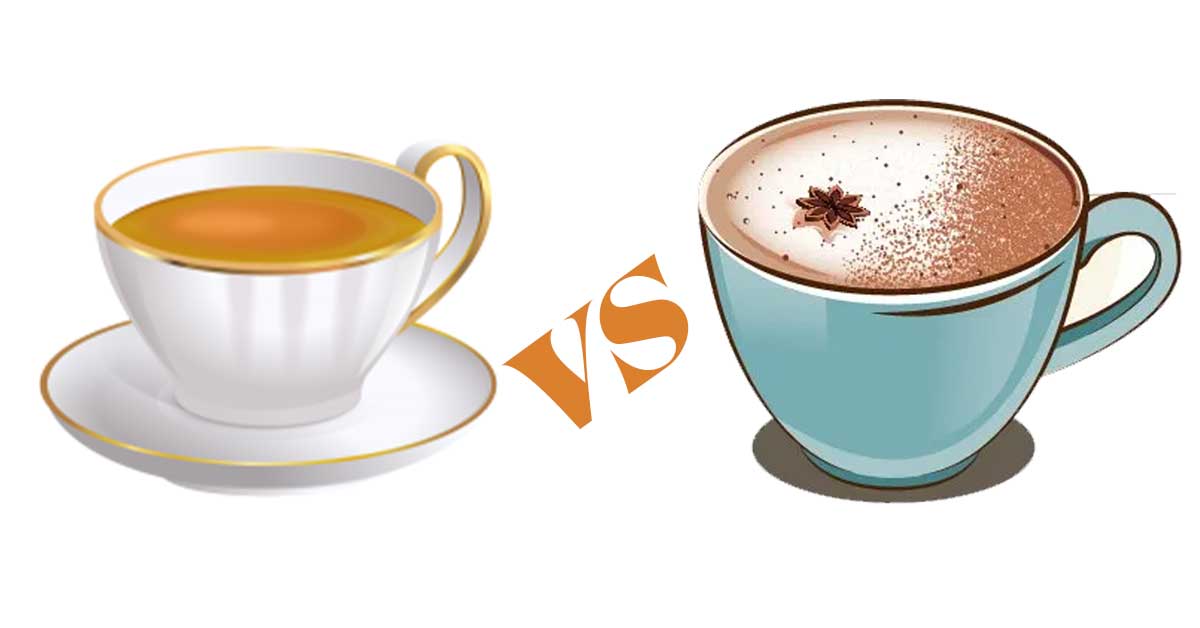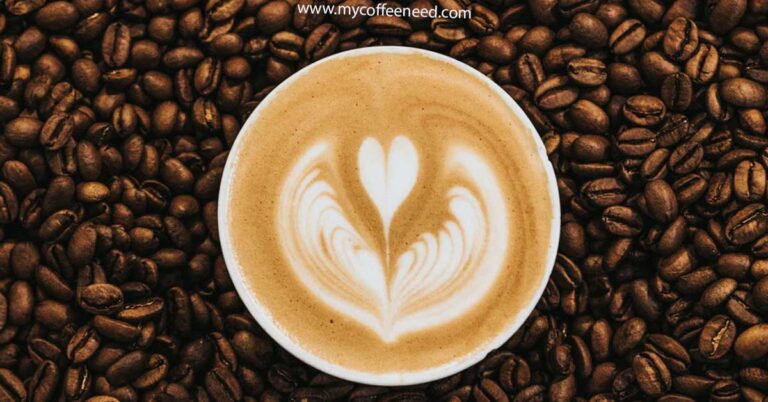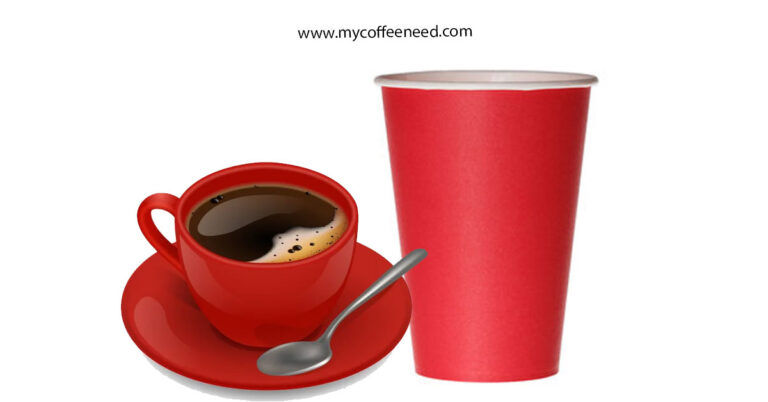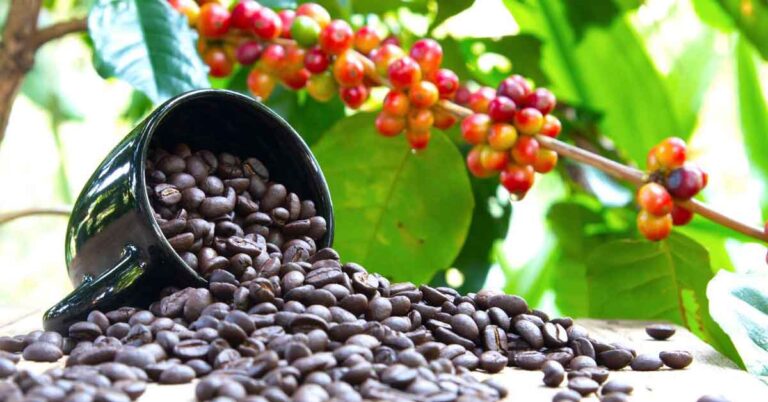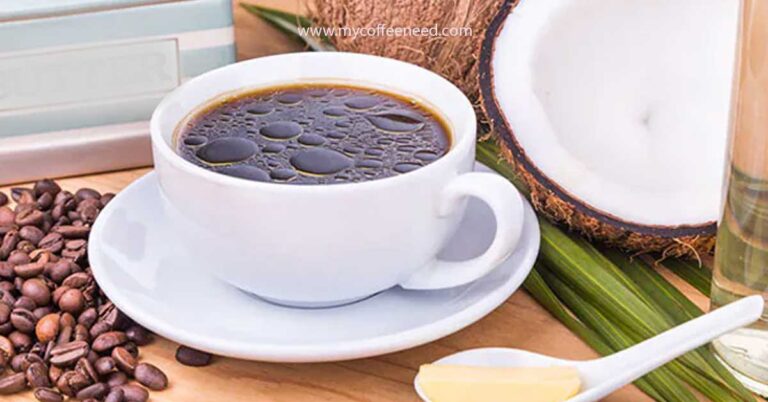Chai Tea Caffeine vs Coffee
Coffee lovers, rejoice! We’re diving headfirst into the flavorful world of caffeine, comparing two beloved drinks – Chai tea and coffee made using the pour-over method.
If you’re a devotee of the daily grind or an enthusiast of exotic spices, this debate will serve up everything you need to know about your caffeine fix.
We’ll be investigating not only the caffeine content but also the unique characteristics that make each of these drinks a favorite among caffeine aficionados worldwide.
So, buckle up, it’s time to delve into the stimulating journey of Chai tea caffeine vs coffee.
Taking a closer look at these two drinks, it is clear that when it comes to caffeine content, coffee takes the lead.
Coffee packs a punch with about 95-200 milligrams per cup while Chai tea contains only about 40-60 milligrams of caffeine per cup.
However, if you choose to make your cup of coffee using the pour over method, you will likely get a stronger hit of caffeine.
This is because the pour over method makes use of freshly ground coffee beans which have not been pre-brewed and thus contain more caffeine than regular drip brew or instant coffee.
When it comes to flavor, both drinks offer unique tastes that can’t be found elsewhere. Chai tea is infused with the unmistakable blend of spices like cardamom, cinnamon, star anise, cloves and peppercorn.
The flavors mix together to create a sweet and spicy taste that is truly unforgettable. Coffee made using the pour-over method presents a different experience altogether – its bolder flavor and stronger aroma will surely tantalize your senses.
Discussing the Versatility of Chai Tea and Coffee
The great thing about both of these drinks is that they can be customized to suit each individual’s tastes. Chai tea can be made with different types of milk and sweetened with honey or sugar, while coffee made using the pour-over method can be adjusted by changing the type of beans used and adding various spices and syrups.
This is what made these two drinks so popular – the ability to customize them to suit each and every palate. Whether you prefer a sweet, spicy chai tea or a bold, aromatic cup of pour-over coffee, you’ll be sure to find something that will satisfy your cravings.
Exploring Milk and Sweetener Options
Chai tea is wonderfully versatile, allowing you to tailor it to your specific preferences. When it comes to milk, the options are plentiful.
Whole milk lends a creamy texture and rich flavor, whereas almond milk imbues the chai with a subtly nutty undertone.
Soy milk and oat milk are fantastic dairy-free alternatives, both adding a smooth and slightly sweet quality to the brew.
Sweeteners, on the other hand, can enhance chai tea’s inherent spiciness while adding a touch of sweetness. Refined sugar can serve as a basic sweetener, but if you’re looking to experiment, honey brings a floral note that complements chai’s robust spice blend beautifully.
For a vegan alternative, try a dollop of maple syrup or a sprinkle of coconut sugar. With these options, each cup of chai tea can become a unique culinary adventure, catered specifically to your liking.
Bean Selection and Flavor Infusion
Pour-over coffee customization begins with the selection of coffee beans. The type of beans used in making pour-over coffee can significantly alter the flavor profile of your brew.
For instance, light roast beans often have a more acidic, fruity flavor, while dark roast beans have a deeper, richer, more robust taste.
The origin of the beans also plays a role in the overall flavor, with beans from different regions having distinct notes and aromas.
Ethiopian beans, for instance, are known for their wine-like and fruity flavor, while Colombian beans exhibit a strong, nutty taste.
For coffee lovers with a flair for experimentation, adding spices and syrups can totally transform the taste of your pour-over coffee.
Cinnamon, nutmeg, or cardamom can be added directly to the coffee grounds before brewing, infusing the coffee with a subtle spiciness that complements the bitterness of the beans.
Vanilla, caramel, or hazelnut syrups can be stirred into the finished brew for a sweet and flavorful twist. Just be mindful of the quantity used to avoid overpowering the inherent flavors of the coffee.
With these customization options, pour-over coffee elevates from a daily beverage to an exciting flavor journey, tailored to cater to your unique palate.
Highlighting the Presence of Caffeine in Both Beverages
Caffeine, the central nervous system stimulant found in both Chai tea and coffee, plays a pivotal role in our daily routines.
It serves as a wake-up call to our bodies, promoting alertness, enhancing cognitive functionality, and even improving physical performance.
This stimulant operates by blocking adenosine, a neurotransmitter that promotes sleep and relaxation, thus leading to increased arousal, vigilance, and the ability to concentrate.
Unpacking the Effects of Caffeine
As a central nervous system stimulant, caffeine has a profound impact on our bodies. It works by blocking adenosine receptors in the brain, thereby disrupting the calming effects of adenosine and leading to increased arousal and alertness.
This not only wakes us up, but also aids in maintaining our focus throughout the day, making both Chai tea and coffee invaluable tools in our daily routine.
Caffeine also aids in promoting cognitive functionality. Regular intake of moderate amounts of caffeine has been associated with improved memory, especially with tasks that require the retention of information over a short period.
Furthermore, it has been linked to increased creativity, faster reaction times, and enhanced problem-solving skills, making it a go-to for those needing a cognitive boost.
Moreover, caffeine’s benefits extend beyond the mental to the physical. It is known to enhance physical performance by increasing the release of adrenaline and making available more fatty acids for the muscles to burn.
This, in turn, provides a boost of energy that can be particularly beneficial before a workout. So, whether you’re a coffee lover savoring a pour-over brew or a Chai tea enthusiast relishing the exotic flavors, the caffeine in these beverages is doing much more than just quenching your thirst.
How Caffeine Works: Blocking Adenosine
Caffeine, the primary active ingredient in both Chai tea and pour-over coffee, exerts its effects by blocking the action of adenosine.
Adenosine is a sleep-promoting neurotransmitter present in the brain that accumulates throughout the day, increasing feelings of tiredness and encouraging sleep.
However, when caffeine enters our system, it competes with adenosine for the same receptors in the brain. By binding to these receptors, caffeine blocks the calming effects of adenosine, leading to increased arousal, vigilance, and concentration.
This mechanism of action explains why we often feel more alert and focused after consuming caffeine-containing beverages.
Our senses become sharper, our thoughts clearer, and we’re able to maintain our concentration for longer periods – indeed, the perfect scenario for any coffee lover or chai tea enthusiast seeking to maximize their day’s productivity.
Chai Tea vs Coffee
When it comes to beverages that fuel our day, caffeine often takes center stage. The significance of caffeine content in our daily brew, be it a comforting cup of Chai tea or a robust pour-over coffee, cannot be underestimated.
Caffeine, a central nervous system stimulant, is the much-needed energy booster that kick-starts our mornings and battles the dreaded afternoon slump.
Coffee, renowned for its high caffeine content, is a popular choice among those seeking a quick energy boost. The exhilarating rush that a pour-over coffee provides is often likened to flipping an internal switch, transforming groggy mornings into productive starts.
As the day progresses, this same brew serves as an effective antidote to afternoon fatigue, reinvigorating our senses and sharpening our focus.
With its bold flavors and high caffeine content, pour-over coffee stands as an indispensable ally in our pursuit of productivity. Stay tuned as we delve into a comparison of the caffeine content, effects, and benefits of these two beloved beverages.
The Gentle Stimulation of Chai Tea
For those sensitive to caffeine or simply looking for a milder alternative to coffee, Chai tea offers a gentle stimulation that quite suits their needs.
The caffeine content in Chai tea is relatively lower, providing a smooth and subtle energy boost without the jittery side effects often associated with higher caffeine doses.
It’s an excellent option for those who want to enjoy a warm, flavorful beverage while also reaping the benefits of caffeine, but in moderation.
Chai tea delivers a satisfying depth of flavor, intertwined with exotic spices and balanced by a hint of sweetness.
This robust symphony of tastes, coupled with its lower caffeine content, makes Chai tea a relaxing yet rejuvenating beverage, perfect for a tranquil midday break or a soothing evening wind-down.
Transitioning from coffee to Chai tea can be an enjoyable shift for the coffee lover, offering a different spectrum of flavors and a more gentle stimulation.
This switch not only introduces a novel tasting experience but also opens the door to a different way of enjoying caffeine – one that is less intense, but equally rewarding.
Coffee, a darling in the morning rituals of many, carries with it a question of intrigue – just how much caffeine resides in that cup? The answer is not as simple as one might think, as it hinges on several factors, from the type of coffee bean to the brewing method.
Variability in Caffeine Content in Coffee
Typically, an 8 oz. serving of coffee contains approximately 95 milligrams of caffeine. However, this can vary widely.
For instance, robusta coffee beans contain almost double the caffeine content of their arabica counterparts, while light roast beans carry slightly more caffeine than dark roasts due to their less extensive roasting process.
The Wake-up Call for the Coffee Lover
The allure of coffee is undeniable, with its rich aromas and diverse flavors inviting us to indulge. But for many, it’s the caffeine content that sets coffee apart.
It’s the secret ingredient that transforms our sleepy mornings into buzzing starts, providing the much-needed energy boost to kickstart our day.
But what determines the caffeine content in your coffee? And how does it influence the coffee experience?
The caffeine content in coffee can be quite variable, influenced by factors such as the type of coffee bean, the roast level, and the brewing method.
For the true coffee lover, understanding these factors can enhance the enjoyment of coffee, allowing for a personalized and informed approach to caffeine intake.
Let’s dive into the world of caffeine in coffee, exploring the factors that influence its content and the role it plays in our beloved brew.
The Baseline
An 8 oz. serving of coffee typically contains around 95 milligrams of caffeine, providing a substantial energy boost to jumpstart your day.
This amount, however, isn’t a fixed number as the caffeine content in coffee can fluctuate based on numerous factors. These include the type of coffee bean used, the roast level, and even the brewing method.
Factors Leading to Variability: A Tale of Two Beans – Robusta vs. Arabica
Among these influencing factors, the type of coffee bean used holds significant sway. Notably, there are two primary types of coffee beans in the market – Robusta and Arabica.
Robusta coffee beans, as the name suggests, are robust in their caffeine content, carrying almost double the caffeine compared to their Arabica counterparts.
This makes Robusta beans the go-to option for those seeking a serious caffeine kick.
Roasting Matters: Light Roast vs. Dark Roast
Interestingly, the roasting process also impacts the caffeine levels in your coffee. It might seem counterintuitive, but light roast beans usually contain slightly more caffeine than the dark roast.
This is because the roasting process breaks down the caffeine molecule, and the longer beans are roasted (as in the case of dark roasts), the more caffeine is lost.
Therefore, if you’re a coffee lover that prefers a coffee that packs a little more caffeine punch, you might want to opt for a light roast.
The Art of Brewing: A Key Player in Determining Caffeine Content
It’s not only the type of beans and roast level that influence caffeine content, but also the brewing method chosen.
Different brewing methods can yield varying caffeine levels, making them a vital factor to consider for those seeking a specific caffeine experience.
Pack a Punch with Espresso
Despite its comparatively small size, an espresso shot contains an impressive concentration of caffeine. Typically, a standard shot of espresso contains approximately 63 milligrams of caffeine.
The short, intense brewing process under high pressure extracts a rich, bold flavor and a significant caffeine hit, making espresso a favorite amongst those looking for a swift, potent caffeine surge.
The Classic Drip Coffee Brew
On the other hand, a standard serving of drip coffee, which is a more common brewing method, contains around 95 milligrams of caffeine.
This method, involving hot water pouring over a filter containing ground coffee beans, results in a balanced, flavorful brew, with a substantial caffeine content that is sure to satiate the caffeine cravings of most coffee lovers.
A Compromise between Espresso and Drip Coffee
For those looking for an option that lies somewhere between espresso and drip coffee, the pour over method is a great choice.
This method involves pouring hot water slowly over a filter containing ground coffee beans, resulting in a cup of coffee with an intense aroma and flavor.
Caffeine-wise, the amount of caffeine in a cup of pour over coffee usually falls between espresso and drip coffee, providing an interesting compromise between intensity and flavor.
The Caffeine Content of Chai Tea
A natural rival to coffee, tea has become increasingly popular amongst those looking for a more gentle approach to their caffeine intake.
In particular, chai tea has risen in popularity over the past few years, largely due to its milder caffeine content and varied flavor options.
The amount of caffeine in one serving of chai tea is usually about 20 milligrams – much lower than coffee’s 95 milligrams per serving.
This makes it a great choice for those who are looking for an energy boost without the intensity or jitters associated with coffee.
Discovering Your Preferred Caffeine Profile
To put it simply, the type of beans used, roast level, and brewing method all contribute to the varying caffeine levels in coffee.
Picking a combination of these factors based on your personal preference can enhance the flavor and intensity of your brew, allowing you to enjoy your coffee ritual in an informed and personalized manner.
A World of Flavor and Caffeine
Notably, the pour-over method, known for its precision and control, can yield even higher caffeine levels. This method allows for a slow and thorough extraction process, maximizing the caffeine content pulled from the coffee grounds.
The key to its effectiveness lies in the use of fresh grounds, which contain higher caffeine levels, and a slow extraction process, which ensures thorough extraction.
For a coffee lover seeking an immersive brewing experience that also promises a good caffeine kick, the pour-over method is an excellent choice.
The result? A cup of coffee that is not only bursting with flavor, but also teeming with caffeine, offering a rejuvenating experience that’s delight to the senses.
Wrapping Up: Chai Tea vs. Coffee – An Energizing Duel
It’s clear that both chai tea and coffee offer substantial benefits when it comes to providing us with an energy boost.
Coffee, with its higher caffeine content, is an excellent quick pick-me-up, perfect for jumpstarting your day or powering through a mid-afternoon slump.
On the other hand, chai tea, despite having an average caffeine content that’s 3% lower than black coffee’s, holds its own as a milder but still effective fuel source, especially for those who may be more sensitive to larger amounts of caffeine.
Whether you’re seeking a jolt to your cognitive function, or a gentler way to enhance alertness and productivity throughout the day, chai tea could be just what you need.
The choice between coffee and chai tea isn’t a battle of superiority, but rather a matter of individual preference, accounting for personal taste, tolerance to caffeine, and the desired level of energy boost.
So, go ahead—brew your cup of chai or pour that coffee and let the caffeine do its work, fueling your day one sip at a time!

